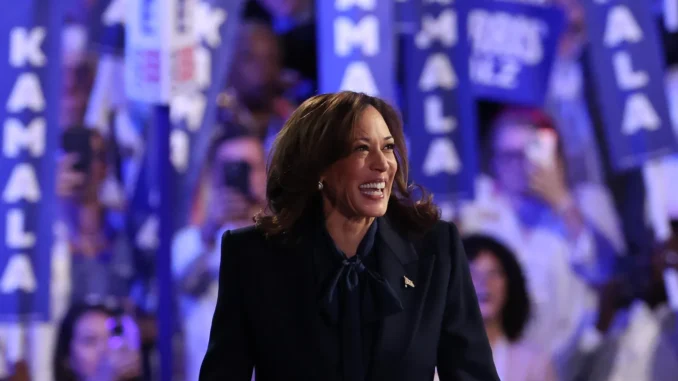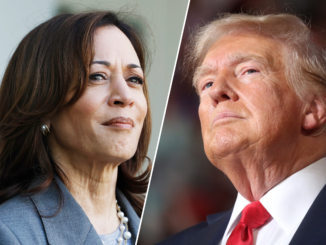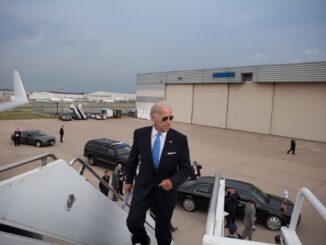
An FP Live discussion with Anne-Marie Slaughter and Matt Duss.
From Oprah Winfrey to the Clintons and the Obamas, a star-studded Democratic National Convention (DNC) came to a close on Thursday night in Chicago with Vice President Kamala Harris formally accepting her party’s presidential nomination.
Foreign policy rarely plays a big role in conventions, which are largely about party unity and generating excitement; but even so, Harris attempted to make the case for her national security bonafides. “I will ensure America always has the strongest, most lethal fighting force in the world,” she declared, before asserting she would focus on besting China in “the competition for the 21st century.
Beyond the rhetoric, what have we learned so far about Harris’s foreign policy? I spoke with Anne-Marie Slaughter and Matt Duss on FP Live the morning after the DNC. Slaughter is a former head of the State Department’s policy planning department, while Duss served for many years as a foreign-policy advisor to Sen. Bernie Sanders. Subscribers can watch the full discussion on the video box atop this page. What follows is a condensed and edited transcript.
Ravi Agrawal: Matt, you’re in Chicago at the scene of the action. What were your takeaways from the DNC, and especially from Harris’s speech?
Matt Duss: In general, it was a pretty good week. Everyone was feeling good. I think it went off very smoothly. We saw the outlines of a pro-worker agenda. This builds on what we saw from President Joe Biden—investments in the American people dealing with cost of living. And as I wrote in FP, there are big international foreign-policy implications for this; but that was the major focus of the first three days. Obviously, there was also a focus on the danger of former President Donald Trump and what he represents not only domestically, but also the phenomenon of autocracy and authoritarianism globally.
Thursday is when we saw much more of a general focus on the issue of foreign policy and national security with a number of veterans, members of Congress with national security backgrounds, and the former Secretary of Defense Leon Panetta coming out on stage. Part of last night’s agenda was to demonstrate that Harris meets the threshold test of being commander in chief.
RA: Anne-Marie, you’ve written in the Financial Times that Harris’s mantra is likely to be a version of “peace through strength.” It struck me that she tried to do exactly that when she spoke last night.
Anne-Marie Slaughter: Yes, I would say what came through very strongly in her speech is strength. The intro video and the first part of her speech projected, “I’m a fighter; I’m a protector; I am strong; I stand up for people against perpetrators.” And so she went through that domestically as a prosecutor, and then segued to “I will keep this country strong and secure” and “I will stand for us in the world.”
There were two other things that struck me. One, and many people have commented on it, the speech was deeply patriotic. I just loved it. If you hadn’t heard the sound, you may have thought this was a Republican convention, from the Pledge of Allegiance to chants of “USA” (which often makes me a little bit uncomfortable). But she is proud to be an American. She loves this country.
The third thing was her mantra of freedom. Jonathan Haidt wrote one of his first books about the values of conservatives and liberals and that liberals tend to focus on equality and justice and conservatives focus on liberty and authority and loyalty. She flipped the script. She was all about freedom—from Beyonce’s music to, more importantly, the freedom to be freed from government interference in human choices, women’s choices, and reproductive rights. And again, she segued from “I stand for freedom for women to control their bodies” to freedom in terms of civil rights so all Americans have an equal shot, and then right into: “I stand for freedom in the world. I stand for the United States against tyranny.”
What you didn’t hear was Biden’s democracies versus autocracies dimension. It was much more personal. It was “Putin is a tyrant,” and we know where we stand against tyrants. She made that crack about how Trump doesn’t stand up to them because he wants to be one. What I came away with was strength and freedom and patriotism.
RA: Matt, I thought she walked a fine line on the Middle East, showing empathy to both Israelis and Palestinians. And on that latter part, it seemed to me that she was trying to create a tiny bit of daylight between herself and Biden. But ultimately it was rhetoric. We don’t know what exactly she’s going to do.
MD: This is language we’ve heard from her before. I think she created daylight with Biden months ago, particularly with the speech she gave in Selma, Alabama. She was much more critical of Israeli policy and lifted up the Palestinian humanitarian crisis in Gaza more than Biden had done. I personally understand the line she was trying to walk.
But I was disappointed in what I heard last night. We heard very effusive and detailed support for Israel in the wake of Oct. 7, 2023. And then we saw some vague support for Palestinians’ rights to self-determination. I know there was a lot of work that was done and she had requests from the Uncommitted Movement and others. There were hopes that we might see something a bit more specific or forward-leaning. I don’t think we got it last night.
We’re still in a campaign, so we didn’t expect to see great detail last night. But this is really a question that I and others have: Is she ready to move forward and represent the Democratic Party of today, not only in domestic but also in foreign policy? As we all know, the issue of Gaza has been really divisive in the party. I think this is something many of us are going to be hoping to hear more from her on in the future.
RA: Matt, you’ve written about this in Foreign Policy, offering concrete proposals for what Harris should do when it comes to Gaza and the Middle East. You’ve said that she should cut military aid to Israel. She should increase aid to UNRWA. Can you expand on that?
MD: It’s not just cutting aid. It’s upholding U.S. law regarding military aid, which is something that could flow very easily from her past as a prosecutor and as someone who has spoken quite eloquently about international law and international norms and standards. The fact of the matter is we are seeing very credible evidence of repeated instances of international humanitarian law violations by the Israeli military over these past ten months. And we also have laws here in the United States that govern the use of American-provided weapons. So I think many are hoping to see some sign that she would enforce these laws and suspend military aid if there is evidence of human-rights violations and of atrocities because we have not seen this from Biden.
RA: Anne-Marie, obviously there’s some disappointment on that element of Middle East policy. But she does have to walk this fine line because she could risk upsetting other parts of the party if she changes too much from what the Biden administration has done so far.
AMS: I heard her quite differently. Her line was, “The Palestinian people can realize their right to dignity, security, freedom, and self-determination.” That was one of the biggest applause lines of her entire speech.
I agree that she was very specific on supporting Israel’s right to defend itself and making sure it had the capacity to defend itself.
But I heard her saying: “We’re not going to split the party right now. I am not going to give Donald Trump an opening here.” And remember, previously, when the pro-Palestinian demonstrators interrupted her speech, she said: “If you want Donald Trump to win, then say that. Otherwise I am speaking.” What I heard last night was: “I hear the entire package for Palestine, and I see the devastation, and I see the horrors, and we are doing everything we can to stop this war. And after this war, here’s what the Palestinian people need. But I am not going to open even a crack that will let the Republicans paint me as soft on Israel.”
RA: Do you think that that could be successful politically?
AMS: I do. I’m glad that we have people in the party, including the Uncommitteds, who are insisting that we focus on the human dimension of this horrific conflict and not just the geopolitics of it. And I think she has made clear that she sees the human dimension.
But I think fundamentally, people are not going to want to divide the party in a way that would prevent her from continuing the desire for a cease-fire and a permanent settlement. Everybody in the Democratic Party has to know that if Trump is elected, that’s the end of American support for any Palestinian self-determination. So I think that was the right call politically, even if inevitably it was going to disappoint some of her supporters.
MD: That statement about Palestinian rights and Palestinian self-determination and humanity coming from that stage, from the candidate, is important. I think we should recognize that.
But I do note the contrast in the specificity toward Israel and the kind of vague remarks on the Palestinians. Even her comment of “what has happened in Gaza.” This is not a natural disaster. This is not a flood or a tornado. This is Gaza being obliterated by a military that is subsidized by the United States and using American bombs.
RA: Broadening out, we didn’t learn much that is new this week about what a potential Harris foreign policy could look like. But, what is your sense of the broader themes and interests that might animate a Harris White House?
AMS: The thing that I notice the most in her speeches and her background is an equal weighting of what I would call the global threats and the geopolitical threats. She made very clear she is going to stand with Ukraine and continue mobilizing all of our allies against Russia. She said we can’t let China win either in space or AI. She was very strong on North Korea and Iran. She checked all those boxes.
But she also said earlier: “As a prosecutor, I fought the cartels that traffic in drugs and guns and people. And those were hard fights. And they are important fights.” I’ve heard her three times at the Munich Security Conference. She always talks about climate, and she doesn’t talk about climate as an afterthought. She talks about development crises and about health as well as about standing firm against aggressive states and states that are threatening the United States. So I expect from her a much more integrated focus on the full spectrum of national security.
I’m glad that you don’t hear this line about democracies versus autocracies from her. I think that signals a shift to a more pragmatic outlook. For example, we have to deal with Saudi Arabia because we’re not going to get Palestinian self-determination without Saudi Arabia and others.
Lastly, I’ll expect a much greater focus on Africa and Latin America. She talks about both. Again, she is a new American president. She herself comes from a mixed background. She lived in the state that has the largest Hispanic population and just reflects this unbelievable diversity. And so I expect to see her focusing more on parts of the world that traditional folks of European American background would focus less on.
RA: Anne-Marie, Harris’s chief foreign policy advisor is Phil Gordon. You know him and cited him in your recent piece in the Financial Times. How much influence can a potential national security advisor have in crafting a president’s foreign policy? And what do you expect from someone like Gordon?
AMS: Gordon’s a lot like Secretary of State Antony Blinken in that you’ll be hard pressed to find anybody in Washington who doesn’t like him or respect him. He is one of these people who’s been around a long time, and he’s worked with many different people. He’s got a reputation as a straight shooter and as someone who is highly competent and pragmatic.
In his most recent book on the Middle East, he comes out against regime change because it just doesn’t end well. He’s not a deeply ideological person. He is committed to peace and prosperity and defending American interests. He has strong interests in Europe. He was the assistant secretary for Europe when I was at State. That is a brutally hard job because you’re traveling constantly.
I think it’s very helpful that he knows Europe and the Middle East, particularly now. But overall, with him, I think you’d get pragmatism, competence, and a focus on maintaining close ties with lots of allies without a particular ideological or even doctrinal tag.
RA: Gordon has a deputy, Rebecca Lissner. We asked one of our columnists, Michael Hirsh, to do a close reading of their two most recent books. So you just mentioned, Anne-Marie, Gordon’s book: Losing the Long Game: The False Promise of Regime Change in the Middle East. And Rebecca Lissner’s book: An Open World: How America Can Win the Contest for 21st Century Order. Hirsh’s take is that both books argue for a less hubristic America, a less arrogant America, perhaps an America that is looking to enforce a rules-based, liberal international order. Matt, is that your sense of an emerging Harris doctrine?
MD: I don’t know if I’d go that far. I think the through line of those books is a sense of rethinking American foreign policy. We are in a moment where I think the old consensus has come apart. The question is, what is the new consensus? Can we build a new shared foreign-policy consensus? The project is actually much bigger. The question is, can we build a shared vision of the American project, such that we can have a durable expression of that project in foreign policy?
If we are talking about a more humble foreign policy, if that means we’re not going to invade and occupy more countries and try and do regime change, I think that’s good. If that means we’re not going to try and uphold a shared set of human rights standards and values, I don’t think that’s good. So I think the question is, where are we going to continue to lean forward and where are we going to pull back? I think Biden’s administration still has commitments ideologically to global primacy and I am hoping a President Harris would move away from that.
RA: Some of what we heard from Harris last night did signal primacy. But there is a generational shift. She clearly has tapped into a broad bipartisan desire not to get mired in too many conflicts. As you’ve pointed out, she’s also thinking more about climate change and AI, in a way that is quite forward looking.
AMS: I think she was checking the box of making sure she could be commander in chief. She does not look like what most people think of when they think commander in chief, so she absolutely nailed that one down, saying, “We’re going to have the most effective and most lethal fighting force in the world.” She also said—and this is that duality in her—that, “I’m going to take care of the soldiers.”
I don’t know that she’d go as far as Lissner and Mira Rapp-Hooper’s book, which basically says the job of the United States is to maintain a world free of spheres of influence, including making sure that China doesn’t have its sphere in Asia and Iran in the Middle East. But that’s a quite minimalist view. It’s fairly evident to me, hearing where Harris is on Ukraine, that she wouldn’t go for that.
I do think though that her definition of American greatness is also about the power of our example. When she was talking about freedom, I was really interested. I kept thinking, what does she mean here? What’s her definition of freedom? And she kept tying it to opportunity. She really closed as she crescendoed: America is the land of opportunity for everyone and that all Americans have the opportunity to achieve what they want to achieve.
You can easily expand that around the world and say, “I’m going to work on human-rights issues.” The trade issues are hard because what is good for Americans often here with jobs is not so good for many people around the world. Those are very hard choices. But I could hear her defining America as a global leader. She said, I’m going to strengthen, not abdicate, our global leadership. I could hear that on a whole set of issues around global health, around climate, around development issues including education, food security, and water security, in a way that would flow pretty seamlessly from what she’s trying to do also at home.
Take the Survey at https://survey.energynewsbeat.com/






